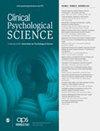成年女性双胞胎的内化症状与饮食失调之间的共病主要是受情绪调节的遗传影响所致
IF 4.1
2区 医学
Q1 PSYCHIATRY
引用次数: 0
摘要
内化(如焦虑、抑郁)和饮食失调(如暴饮暴食、节制饮食)是高度并发症,但其并发机制仍不清楚。这是第一项双生子研究,旨在探讨情绪调节(ER;调节情绪持续时间/强度的能力)的遗传和/或环境影响是否会导致这两种疾病的并发。分析对象包括密歇根州立大学双胞胎登记处的 688 对成年女性双胞胎。乔尔斯基分解双胞胎模型显示,维度建模的内化和外化之间的合并症是由重叠的遗传(r = .55;69.3%的共享方差)和非共享的环境影响(r = .26;30.7%的共享方差)造成的。当ER被加入到模型中时,所有内化和外显之间共享的遗传影响都可归因于ER,这表明ER的遗传影响是内化和外显之间合并症的主要驱动因素。共享基因可能会影响情感处理、感知间敏感性或其他与ER有关的大脑过程(如认知控制)。本文章由计算机程序翻译,如有差异,请以英文原文为准。
Comorbidity Between Internalizing Symptoms and Disordered Eating Is Primarily Driven by Genetic Influences on Emotion Regulation in Adult Female Twins
Internalizing (e.g., anxiety, depression) and disordered eating (DE; e.g., binge eating, dietary restraint) are highly comorbid, but the mechanisms underlying their comorbidity remain unknown. This was the first twin study to examine whether their co-occurrence may be driven by genetic and/or environmental influences on emotion regulation (ER; ability to modulate duration/intensity of emotions). Analyses included 688 adult female twins from the Michigan State University Twin Registry. Cholesky decomposition twin models showed that comorbidity between dimensionally modeled internalizing and DE was due to overlapping genetic ( r = .55; 69.3% of shared variance) and nonshared environmental influences ( r = .26; 30.7% of shared variance). When ER was added into the model, all genetic influences shared between internalizing and DE were attributable to ER, suggesting genetic influences on ER are the primary driver of comorbidity between internalizing and DE. Shared genes may shape affective processing, interoceptive sensitivity, or other brain-based processes (e.g., cognitive control) implicated in ER.
求助全文
通过发布文献求助,成功后即可免费获取论文全文。
去求助
来源期刊

Clinical Psychological Science
Psychology-Clinical Psychology
CiteScore
9.70
自引率
2.10%
发文量
35
期刊介绍:
The Association for Psychological Science’s journal, Clinical Psychological Science, emerges from this confluence to provide readers with the best, most innovative research in clinical psychological science, giving researchers of all stripes a home for their work and a place in which to communicate with a broad audience of both clinical and other scientists.
 求助内容:
求助内容: 应助结果提醒方式:
应助结果提醒方式:


